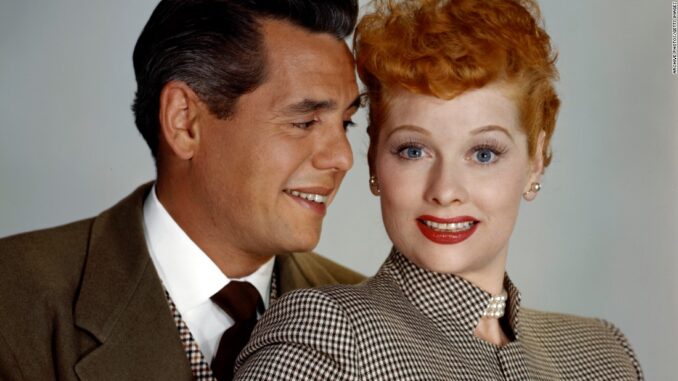
The grape stomping, the chocolate factory, the fake nose on fire — few images are as fully ingrained in our collective pop culture consciousness as these classic scenes from “I Love Lucy,” the pioneering sitcom that debuted on Oct. 15, 1951 and after nine seasons of original material, has never left airwaves. The 60th anniversary of its debut is Saturday.
The celebration is in full swing. In Washington at the Library of Congress’s Madison Building (101 Independence Ave., S.E.), an exhibit called “I Love Lucy: An American Legend” featuring scrapbooks, photos and scripts, is on display through Jan. 28. Visit loc.gov for details.
Everybody, it seems, loves Lucy, but spend much time on the message boards or in the fan clubs and it becomes apparent pretty quickly — the show, and Lucille Ball herself (who would have been 100 this year), has a lot of gay fans, especially among men. But why? The show was as hetero-normative as it gets and Ball, while glamorous at times, was just as likely to dress up like Harpo Marx or Superman as project any kind of Dietrich- or Garbo-esque glamour.
That Ball herself was supportive of gay rights didn’t become apparent until decades later. Was there something about Lucy Ricardo gay men watching the show as kids could identify with? Not taking no for an answer from hetero male (i.e. Ricky) domination? Ethel as a sort of fag hag? A bitchy faux friendship with Carolyn Appleby (the still-with-us Doris Singleton)? A yearning for show biz and stardom and to transcend the mundane? Or was it simpler than all that? We asked around.
It’s not a universally held notion. Gay actor Jim Brochu, who knew Ball closely and wrote of their friendship in his memoir “Lucy in the Afternoon,” is baffled by the theory. He points to his long-time friend Richard Bell, a fellow Lucy fan, for help.
Bell says it’s not hard to connect the dots. He says her versatility was a big part of it.
“She could be totally glamorous,” Bell says. “Tall, regal with the figure and the face and the hair. But then she could turn on a dime and be this real low down sort of broad of a character. She could go from being sort of this grand duchess to being a truck driver, and I don’t mean that in a bad way, but it always boils down to this sense of camp and the ridiculous and gay men in my generation we just laugh at things that are quote-unquote campy and she was. … When she lights her nose on fire with Bill Holden, it’s just camp. We get that and we understand and appreciate what it is.”
Another gay longtime fan, Lou Weiss, who was in the audience during a taping of her ill-fated final sitcom “Life With Lucy,” has other theories.
“Lucille Ball and Lucy Ricardo were both strong women,” he says. “I think people think of Lucy Ricardo first because when the drag queens do her, that’s the look they copy first because obviously it’s her most famous character. But Lucille Ball really became the icon as she spoke out for the underdog. Lucy Ricardo was the underdog and gays coul relate to that. It’s possibly why she became an icon but Lucille Ball or Lucy Ricardo, it doesn’t matter. Lucy was very gay friendly and she would do things that let you know she thought the creativity of gay people was perfectly all right. She went to visit the drag queens who were impersonating her, she would show up at the clubs. She even befriended Jim Bailey and became one of his biggest cheerleaders.”
One of Bell’s fondest memories is when Brochu arranged for Ball to call him on his birthday one year. He says now he stuck both feet in his mouth and felt like Lucy Ricardo making an ass of herself in the presence of John Wayne or Richard Widmark.
“You know, anytime I see those old episodes, they still make me laugh every time,” he says. “I can watch that goddamn chocolate factory and every time I’m fucking convulsing by the end of it. It’s the funniest thing I’ve ever seen in my life.”
Bell remembers seeing Alec Baldwin with Robert Osbourne on TCM during a recent Ball tribute and Baldwin commenting that he never got into the comedy queen.
“That kind of struck me,” he says. “I thought, maybe it’s not a straight guy thing, I don’t know.”
Even the show’s many scenes of cross dressing never channeled any sort of gay vibe. The show’s gayest moment — with gay designer Don Loper playing himself during a fashion show in which Lucy has to fight a painful sunburn to appear — wasn’t explicit, nor would one expect it to be considering the era.
Still with a female lead and female-centric situations — a new hat, a new dress — driving many of its storylines, some fans say it has a “girliness” that some gay men get.
“I think there was kind of a chi-chi thing going on,” Bell says. “Like when she buys Ethel those hideous hostess pants. Lucy (Ricardo) had a kind of yearning for a more glamorous life. It makes sense.”
